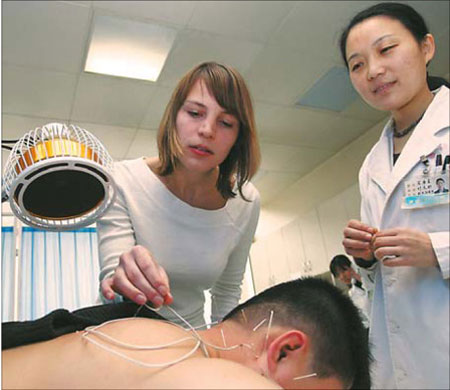 |
|
A German student learns acupuncture at Weifang Traditional Chinese Medicine Hospital in Shandong province. [China Daily]
|
Wally Simpson has been to China only once - for a three-week trip through the rural areas of Hunan province - in 2004.
But he is known in Queensland, Australia as a certified TCM (traditional Chinese medicine) doctor and experienced teacher of qigong, tai chi, and bagua zhang.
Simpson has been in private practice for 22 years ever since he graduated with a bachelor's degree at an acupuncture college in Brisbane in 1987.
In his TCM practice, Simpson uses gua sha (body-scraping), ba guan fa (cupping), tuina (push and grasp), acupuncture and moxibustion, and Chinese herbs.
His patients are mostly Westerners who have received little help from Western medicine.
Some are drawn by the good reports they have heard about Chinese medicine, others are so desperate that they are willing to try anything, while still others have chronic conditions that appear to respond to TCM, Simpson says. He says a great majority of first-time patients are pleasantly surprised at the results, and in turn tell family and friends.
"It (TCM) is in our university systems now and all health funds except the government one, pay a rebate for services preformed by a practitioner who belongs to a recognized association," he adds.
"We hope to complete our registration with the federal government in 2012."
The association Simpson belongs to has a membership of around 2,000 practicing members.
They hosted the World Federation of Acupuncture & Moxibustion Societies conference in 2004 at the Gold Coast in Queensland, drawing around 950 people.
They also run an annual regional conference, which attracts people from the US, UK, Germany, China, Korea, Japan, Indonesia, New Zealand and every state in Australia.
"Thanks to its unique advantage in treating chronic diseases, and success with difficult and complicated cases, TCM is gaining a firm foothold in healthcare worldwide," says Guo Bisong, a Chinese-born, certified TCM doctor who has been practicing in Newcastle and London for 20 years.
She uses qigong, cupping, tuina, dian xue (acupressure), acupuncture and moxibustion, and Chinese herbs and treats some 4,000 patients per year.
"Only 10 percent of my patients are overseas Chinese. Most local patients accept my medical advice and adjust their lifestyle as suggested," says Guo.
Guo's observations are echoed by Carolyn Kissane, clinical associate professor with New York University's Center for Global Affairs.
"Here in the United States there seems to be growing interest in traditional Chinese medicine and more people are open to balancing traditional medicine with more contemporary practices and therapies," says Kissane.
"To me, Chinese medicine represents a more holistic approach to healing the body - it uses both herbs and simple procedures to heal and enhance body functions and capacities," explains Kissane.
"I've benefited from acupuncture and acupressure as have many people I know, and I am an ardent supporter of looking for alternatives to prescription medications."
According to Guo, TCM practitioners can now be found in more than 130 countries and at least 176 TCM medical colleges with full teaching capacity have been established worldwide over the past few decades.
There are reportedly more than 30,000 acupuncturists in legal practices in 49 states in the US. There are also more than 20 large-scale TCM colleges and at least 40 TCM research societies and 10 TCM or acupuncture magazines in the United States.
Based on the 1997 NIH (National Institutes of Health ) Consensus Conference on Acupuncture, medical bills for acupuncture treatment are covered by some insurance companies in some parts of the United States.
In the UK, more than 2.5 million people receive alternative and complementary treatment, including traditional Chinese medicine, in at least 4,000 TCM clinics.
However, "China only enjoys a 10 percent market share while Japan and South Korea dominate the global markets for herbal medicines," points out Yue Housheng, author of Tao of Chinese Medicine, a certified TCM doctor, and a famed expert on regional security in Beijing.
In April 2004, a European directive on the licensing of herbal medicines was introduced following increasing public interest in the use of herbal products.
Traditional Chinese medicine should be promoted as "a common cultural heritage of mankind and a pillar industry for China in coming decades," adds Yue.
(China Daily June 16, 2009)